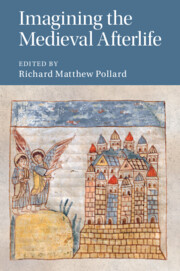Book contents
- Imagining the Medieval Afterlife
- Cambridge Studies in Medieval Literature
- Imagining the Medieval Afterlife
- Copyright page
- Contents
- Figures
- Contributors
- Preface and Acknowledgements
- Abbreviations
- Imagining the Medieval Afterlife: Introduction
- Part I Chronological Surveys
- Chapter 1 Just Deserts in the Ancient Pagan Afterlife
- Chapter 2 Visions of the Afterlife in the Early Medieval West
- Chapter 3 A Morbid Efflorescence: Envisaging the Afterlife in the Carolingian Period
- Chapter 4 The Afterlife in the Medieval Celtic-Speaking World
- Chapter 5 Anglo-Saxon Visions of Heaven and Hell
- Chapter 6 Otherworld Journeys of the Central Middle Ages
- Chapter 7 Visions of the Otherworlds in the Late Middle Ages, c. 1300–c. 1500
- Part II Theological Perspectives
- Part III Artistic Impressions
- Part IV Notable Authors and Texts
- Bibliography
- Index
- Cambridge Studies in Medieval Literature
Chapter 4 - The Afterlife in the Medieval Celtic-Speaking World
from Part I - Chronological Surveys
Published online by Cambridge University Press: 07 December 2020
- Imagining the Medieval Afterlife
- Cambridge Studies in Medieval Literature
- Imagining the Medieval Afterlife
- Copyright page
- Contents
- Figures
- Contributors
- Preface and Acknowledgements
- Abbreviations
- Imagining the Medieval Afterlife: Introduction
- Part I Chronological Surveys
- Chapter 1 Just Deserts in the Ancient Pagan Afterlife
- Chapter 2 Visions of the Afterlife in the Early Medieval West
- Chapter 3 A Morbid Efflorescence: Envisaging the Afterlife in the Carolingian Period
- Chapter 4 The Afterlife in the Medieval Celtic-Speaking World
- Chapter 5 Anglo-Saxon Visions of Heaven and Hell
- Chapter 6 Otherworld Journeys of the Central Middle Ages
- Chapter 7 Visions of the Otherworlds in the Late Middle Ages, c. 1300–c. 1500
- Part II Theological Perspectives
- Part III Artistic Impressions
- Part IV Notable Authors and Texts
- Bibliography
- Index
- Cambridge Studies in Medieval Literature
Summary
This chapter assesses the evidence from the medieval Celtic-speaking world for visions of heaven, hell, and the intermediary state. It begins with a critique of twentieth-century scholarship, which tended to focus its attention on the most fantastical vision texts at the expense of explicating a more representative sample of primary sources. The disparity is noted in the survival rate of texts from medieval Ireland as opposed to medieval Wales, and it is argued that medieval Welsh conceptions of the afterlife need to be pieced together from fragmentary references in religious poetry and other sources. By contrast, many extended descriptions of the afterlife survive from medieval Ireland – both freestanding vision texts and vision narratives embedded in sources of other genres. These are assessed in the context of an argument that more close readings of visions are needed before medieval Irish and Welsh geographies of the afterlife can be fully understood.
Keywords
- Type
- Chapter
- Information
- Imagining the Medieval Afterlife , pp. 62 - 78Publisher: Cambridge University PressPrint publication year: 2020

